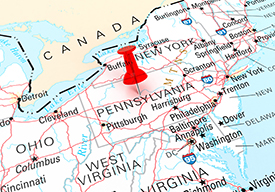Last Updated: Feb 23, 2021
On Feb. 22, 2021, the Pennsylvania Superior Court issued a decision in the case of Dockery v. Thomas Jefferson University Hospitals, Inc., et al. upholding the trial court’s order to transfer a medical professional liability case out of Philadelphia County and thereby also upholding the existing venue rule and statute for medical professional liability actions.
Background of Case
In this case, plaintiffs filed a medical professional liability action against defendants in Philadelphia County. Defendants filed preliminary objections arguing that the proper venue for this case was in Delaware County.
The current venue rule and statute provides that such actions may be brought against a health care provider for a medical professional liability claim only in the county in which the cause of action arose.In its decision, the Philadelphia Court of Common Pleas noted that both the statute and judicial rule regarding venue are constitutional. As to the statute (42 Pa.C.S. § 5101.1), the court found that the statute promotes a legitimate state interest of providing a high-quality health system for Pennsylvania residents and also ensures that medical professional liability insurance is obtainable at a reasonable cost.
As to the judicial rule (Pa. R.C.P. 1006(a)(1)), the court found that the rule was enacted to control the reach and scope of existing venue rules. As such, the court found that both the statute and the court rule do not violate constitutional guarantees of a free and open court system.
The plaintiffs subsequently filed an appeal to the Superior Court. The plaintiffs argued that both the statute and the rule are unconstitutional.
Reviewing the plaintiffs’ arguments, the Superior Court ultimately found that the plaintiffs did not properly mount a constitutional attack against the venue rule. The Court concluded that the plaintiffs failed to contend that the Supreme Court of Pennsylvania lacked any reasoned basis for discriminating against medical-malpractice plaintiffs on the question of venue. Because the plaintiffs’ challenge to the Rule failed, the case had to be transferred out of Philadelphia County per the venue rule’s requirements and the Court did not need to address the merits of the rule’s constitutionality.
What does this decision mean for venue?
- The current venue rule and statute, which provides that suits may only be filed in the county in which the alleged act of malfeasance occurred, remains intact and unchanged.
- There is no effect on the venue rule as a result of this decision. Obtainment of professional liability insurance will remain unchanged.
- Plaintiffs will not be able to transfer cases to more plaintiff friendly venues as a result of this decision.
The Superior Court’s full opinion can be accessed here.
PAMED Advocacy
On July 8, 2020, the Pennsylvania Coalition for Civil Justice Reform (PCCJR), of which the Pennsylvania Medical Society (PAMED) is a health care member, filed an amicus brief in support of the existing venue rule for medical professional liability actions.
You can read a copy of PCCJR’s amicus brief here.
PAMED will continue to stay actively involved in this case and will provide updates to its members as they occur.
To learn more about PAMED’s ongoing advocacy in support of the current venue rule, visit www.pamedsoc.org/venuerule.
